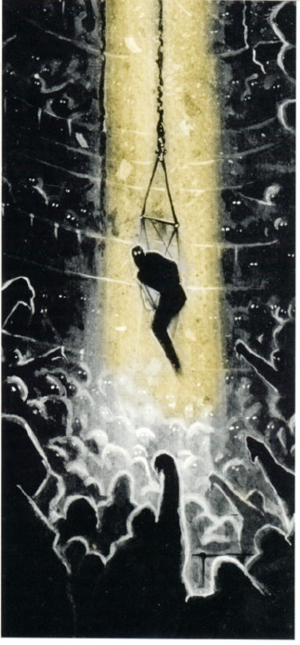Difference between revisions of "Camarilla/Traditions"
(updated spacing to be the same) |
|||
| Line 45: | Line 45: | ||
Thy Domain is thine own concern. All others owe thee respect while in it. None may challenge thy word while in thy Domain. | Thy Domain is thine own concern. All others owe thee respect while in it. None may challenge thy word while in thy Domain. | ||
| − | Reality: The entire city is the Domain of the Prince. Those who are in it, are there because they have been granted permission to take up residence. They are granted permission for a number of reasons usually stemming from political pressures, custom, alliances, etc. However, the Prince does parcel out portions of his Domain to others as a reward for service. These parcels are often seen as little Domains of their owners and they expect respect of visitors. This interpretation is usually granted as the Prince and in turn can expect that these Kindred watch over their granted Domains. It also sets a good precedent to honor the Second Tradition in this way as it placates younger Kindred and demonstrates that the Traditions apply to all – in theory. However when it comes to turf and Kindred, the reality is that you’re only entitled to respect if you can hold onto it. | + | '''Reality:''' The entire city is the Domain of the Prince. Those who are in it, are there because they have been granted permission to take up residence. They are granted permission for a number of reasons usually stemming from political pressures, custom, alliances, etc. However, the Prince does parcel out portions of his Domain to others as a reward for service. These parcels are often seen as little Domains of their owners and they expect respect of visitors. This interpretation is usually granted as the Prince and in turn can expect that these Kindred watch over their granted Domains. It also sets a good precedent to honor the Second Tradition in this way as it placates younger Kindred and demonstrates that the Traditions apply to all – in theory. However when it comes to turf and Kindred, the reality is that you’re only entitled to respect if you can hold onto it. |
|} | |} | ||
| Line 54: | Line 54: | ||
| | | | ||
Thou shall only Sire another with the permission of thine elder. If thou createst another without thine elder's leave, both thou and thy Progeny shall be slain. | Thou shall only Sire another with the permission of thine elder. If thou createst another without thine elder's leave, both thou and thy Progeny shall be slain. | ||
| + | |||
'''Reality:''' This Tradition is very strictly controlled by most Princes. This is because population control makes sense as a measure to uphold the Masquerade. Even few Anarchs argue the logic of keeping the numbers of Kindred in check. Some Princes have been known to extend the right to apply even to Ghouls, forcing Kindred to ask permission to take on another servant. This is extreme, but in some cases necessary among neonates who are eager to overextend themselves without thinking about the practical issues with regard to managing multiple servitors and thralls. In a world of finite resources and infinite lifespans, Kindred are quick to point out any offenders and have them meet their Final Deaths – especially if by chance that meant that they had an opportunity to commit Diablerie. | '''Reality:''' This Tradition is very strictly controlled by most Princes. This is because population control makes sense as a measure to uphold the Masquerade. Even few Anarchs argue the logic of keeping the numbers of Kindred in check. Some Princes have been known to extend the right to apply even to Ghouls, forcing Kindred to ask permission to take on another servant. This is extreme, but in some cases necessary among neonates who are eager to overextend themselves without thinking about the practical issues with regard to managing multiple servitors and thralls. In a world of finite resources and infinite lifespans, Kindred are quick to point out any offenders and have them meet their Final Deaths – especially if by chance that meant that they had an opportunity to commit Diablerie. | ||
|} | |} | ||
| Line 63: | Line 64: | ||
| | | | ||
Those thou create are thine own children. Until thy Progeny shall be Released, thou shall command them in all things. Their sins are yours to endure. | Those thou create are thine own children. Until thy Progeny shall be Released, thou shall command them in all things. Their sins are yours to endure. | ||
| + | |||
'''Reality:''' Few Sires would argue that once their Childe is Released, they no longer are responsible for them and expect to get away with it. Indeed one of the favored attacks by Kindred is to smear their enemies by embarrassing them through the mishaps of less wise and experienced Progeny. Furthermore, this sense of accountability can extend to clans within a city and even coteries. No one wants to be in the same clan as that “fuck up” over there or in the same coterie as that “douche bag” over here. Clans and coteries therefore jump at the chance to take care of their own dirty laundry “in-house” if they can help it – quickly and quietly. | '''Reality:''' Few Sires would argue that once their Childe is Released, they no longer are responsible for them and expect to get away with it. Indeed one of the favored attacks by Kindred is to smear their enemies by embarrassing them through the mishaps of less wise and experienced Progeny. Furthermore, this sense of accountability can extend to clans within a city and even coteries. No one wants to be in the same clan as that “fuck up” over there or in the same coterie as that “douche bag” over here. Clans and coteries therefore jump at the chance to take care of their own dirty laundry “in-house” if they can help it – quickly and quietly. | ||
| Line 90: | Line 92: | ||
| | | | ||
Thou art forbidden to destroy another of thy kind. The right of Destruction belongeth only to thine Elder. Only the Eldest among thee shall call the Blood Hunt. | Thou art forbidden to destroy another of thy kind. The right of Destruction belongeth only to thine Elder. Only the Eldest among thee shall call the Blood Hunt. | ||
| + | |||
'''Reality:''' Only the Prince has the right to kill another Kindred in his Domain. That is an application of the Second Tradition affecting the Sixth that is widely held as precedent. However, elders and councilors will often times get rid of their own clan troublemakers before they become too embarrassing politically. This is a risky position if the elder is a rival of the Prince because often Princes are keen to use these unsanctioned murders as a means by which to dispatch enemies if they are discovered. It is generally interpreted that the Prince be considered the one who is the “Eldest” when it comes to calling Lextalionis or the Blood Hunt. When a Blood Hunt is called, few Kindred snub the Prince by not participating as the reward for catching the subject of the Blood Hunt can involve Diablerie. That is a potential reward that is too good to pass up. | '''Reality:''' Only the Prince has the right to kill another Kindred in his Domain. That is an application of the Second Tradition affecting the Sixth that is widely held as precedent. However, elders and councilors will often times get rid of their own clan troublemakers before they become too embarrassing politically. This is a risky position if the elder is a rival of the Prince because often Princes are keen to use these unsanctioned murders as a means by which to dispatch enemies if they are discovered. It is generally interpreted that the Prince be considered the one who is the “Eldest” when it comes to calling Lextalionis or the Blood Hunt. When a Blood Hunt is called, few Kindred snub the Prince by not participating as the reward for catching the subject of the Blood Hunt can involve Diablerie. That is a potential reward that is too good to pass up. | ||
|} | |} | ||
Revision as of 17:09, 14 May 2021
| Main Camarilla Page | |||
|---|---|---|---|
|
“Masquerade, paper faces on parade. Hide your face so the world will never find you.” | |||||||||||||||||
|
|
||||||||||||||||

